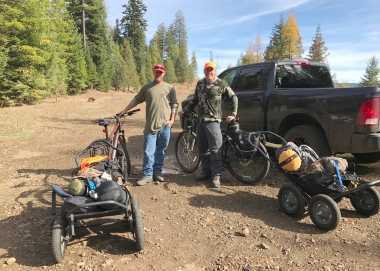
Hunter's plan for success
Oregon offers some great opportunities for the first-time hunter -- from deer and elk, to geese and ducks, to chukar and pheasants. Here are a few pointers to help you get started.
Hunter's Guide Hunter's Resources Hunter's Technique Hunter's Bounty

Hunt preparation
Register now to attend an ODFW Hunter Recruitment Program workshop to up your Big Game hunting success.
Purchase your license and tags prior to the deadline.
Practice and attend Sight-in days at your local range.
Start scouting – map and pin while hiking through your hunt area, spotting vital resources including food, water and cover. Look for signs of game – trails, tracks, scat.
Good advice
Whenever you're venturing into the backcountry, even for a day, you should be prepared to deal with minor injuries, getting lost and unexpected changes in the weather. You will also need tools to field dress and carry out your harvest.
Check the weather forecast.
Look up access restrictions.
Pack the essentials for outdoor survival.
Let someone know where you're going and when to expect your return.
Replace batteries and charge on the way.
Follow us on social media or get our weekly Recreation Report to learn about hunting opportunities, important deadlines, tips and more.

Pack it up
Rules and safety
License/ tags/ hunter education card (if under age 18)
Hunting regulations
Blaze orange clothing (encouraged for all; required if under 18)
First aid kit
Whistle
Small mirror
Cell phone
Navigation
Maps
GPS - phone apps
Compass
Hunt Essentials
Firearm/ammunition
Bow/arrows
Game calls
Binoculars/spotting scope/range finder
Personal Essentials
At least two quarts of water
Food for at least one day
Water filter and/or water purification tablets
Shelter – tarp, tent
Lightweight sleeping bag
Warm clothes
Flashlight/headlamp and extra batteries

Pack it out
Field dressing and other tools
Knives/sharpening tool
Game bags
Nitrile or similar gloves
550 paracord or similar rope
Multi-tool
Orange flagging ribbon – use to tag harvest, *high visibility on carry out for other hunters, and trail marking

